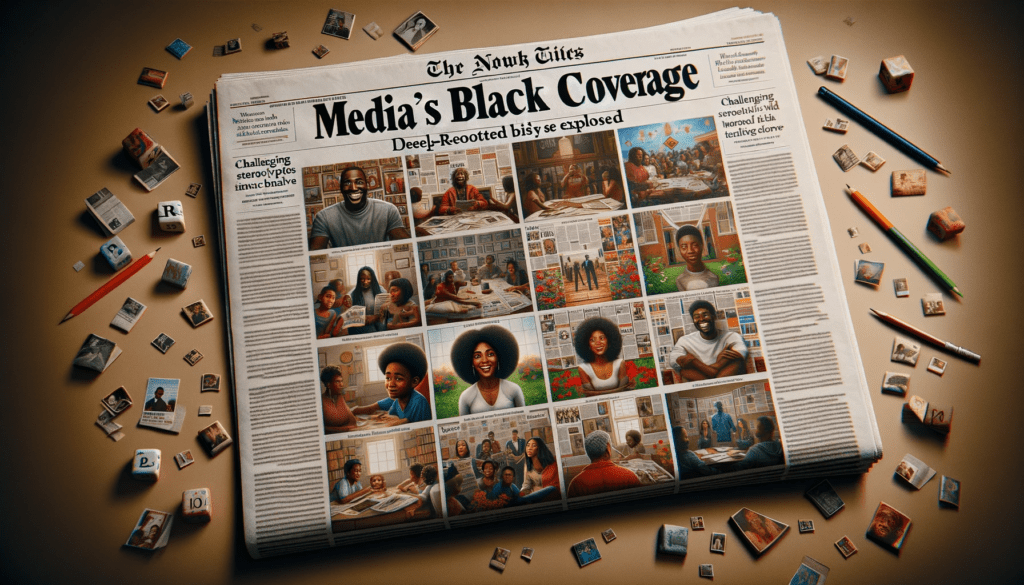
By Darius Spearman (africanelements)
Support African Elements at patreon.com/africanelements and hear recent news in a single playlist, plus get early access to ad-free video content.
Pew study reveals Black Americans’ deep-seated concerns about racial bias in media, sparking urgent calls for change.
Introduction
The Pew Research Center’s 2023 survey, involving 4,742 Black American adults, has uncovered stark concerns about media representation of Black communities. This study is a wake-up call for the media industry, spotlighting the need for more balanced and inclusive journalism (Pew Research Center).
Survey Insights
- 63% of Black Americans see their media representation as predominantly negative, a view shared regardless of age, gender, and political affiliation (Pew Research Center).
- 57% feel the media only highlights certain segments of Black communities, omitting a comprehensive perspective.
- 43% believe that news coverage frequently stereotypes Black people, echoing long-standing issues identified by the Kerner Commission in 1967.
Expert Perspectives:
“African-Americans were overrepresented as perpetrators, and Latinos and whites were underrepresented as perpetrators,” notes Travis Dixon, highlighting a historical pattern of racial bias in media portrayal (Journalist’s Resource).
Katerina Eva Matsa, managing director of Pew’s news and information research team, emphasizes this study’s role in quantifying longstanding conversations about racial bias in news coverage:
“I feel that this study puts numbers and confirms a lot of those conversations, or doesn’t confirm some of these conversations. And I’m very proud of that — to have that out there, and help people understand not everything, but part of what is happening,” she said (Poynter).
Addressing the Issue
- 76% of Black Americans call for journalists to present all sides of an issue.
- 73% underline the importance of understanding historical contexts in reporting.
- Educating journalists about issues impacting Black Americans is seen as critical by 64% of respondents.
A Call for Change:
Despite the sobering findings, only 14% of Black Americans are confident that fair media coverage will be achieved in their lifetimes. This highlights a deep-rooted skepticism and an urgent need for reform in media practices and representation.
The Pew Research Center’s findings not only illuminate the longstanding concerns of Black Americans regarding media representation but also serve as a clarion call for transformative change within the industry.
Despite the disturbing insights, the survey reveals that only a minority, 14%, of Black Americans harbor high confidence that their communities will receive fair media coverage in their lifetimes. This statistic underscores a profound and deep-rooted skepticism, reflecting decades, if not centuries, of biased reporting and stereotypical portrayals in the media. The magnitude of this skepticism signifies an urgent need for introspection and reform within the journalistic sphere.
To address these ingrained biases, survey respondents advocate for a multipronged approach:
- Holistic Representation: A resounding 76% of Black Americans emphasize the necessity for journalists to present all facets of an issue, underscoring the need for a shift from monolithic portrayals to a more nuanced and comprehensive representation of the Black experience.
- Historical Context and Depth: 73% of respondents highlight the critical importance of understanding and incorporating the historical context surrounding issues affecting Black communities. This perspective is essential for media outlets to provide more informed, empathetic, and accurate reporting.
- Educational Initiatives: 64% of Black Americans see educating journalists on issues impacting their communities as a pivotal step towards fairer coverage. This could involve training programs, workshops, and collaborations with cultural and historical experts to enhance journalists’ understanding and sensitivity.
- Diverse Newsrooms: In addition to these educational measures, there is a strong call for increasing diversity within newsrooms. Respondents believe that including more Black voices as sources (54%), hiring more Black individuals in newsroom leadership positions (53%), and recruiting more Black journalists (44%) are key steps toward achieving a more balanced and empathetic media landscape.
Conclusion
The Pew Research Center’s survey serves as a crucial reminder of the media’s responsibility to represent all communities fairly and accurately. As the industry reflects on these findings, the voices of Black Americans and the insights of experts like Dixon and Matsa must guide a much-needed transformation.
This survey serves as a stark reminder of the significant work that lies ahead for the media industry. It’s a call to action for news organizations to reassess their practices, biases, and the composition of their teams. In doing so, they can begin to rebuild trust and ensure that the stories of Black Americans are told with the accuracy, respect, and dignity they deserve. As the industry grapples with these challenges, the voices and insights of Black Americans must remain at the forefront, guiding a much-needed transformation towards equitable and responsible journalism.
About the author:
Darius Spearman is a Professor of Black Studies at San Diego City College, where he has been pursuing his love of teaching since 2007. He is the author of several books, including Between The Color Lines: A History of African Americans on the California Frontier Through 1890. You can visit Darius online at africanelements.org
